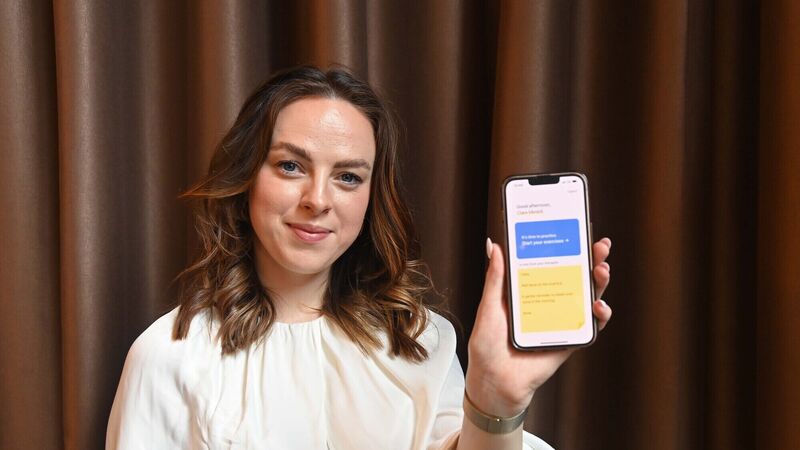UCC graduate’s app to aid Parkinson’s patients

Clare Meskill, co-founder and CEO of Teleatherapy, showing the app on a phone. Picture Denis Minihane.
PRE-SEED funding worth €700k has been sourced for a unique new app specially designed for Parkinson’s patients.
Cork-based Clare Meskill, CEO and co-founder of speech therapy technology company Teleatherapy, raised the funds from private investors and Enterprise Ireland.
The registered speech and language therapist founded the app in November 2020 before welcoming Dave Calnan as co-founder in 2022. Mr Calnan has taken charge of technical development in the company.
The app contains speech therapy exercises which speech/language therapists can prescribe for patients to complete in their own homes. This allows speech therapists to monitor the progress of patients. It is hoped this can lead to reduced waiting times for those living with the condition.
Clare was initially provided with a platform for the idea by UCC’s IGNITE programme. The initiative, which is open to recent UCC graduates, has worked with more than 160 start-ups over the last 11 years, creating more than 370 jobs in the process.
She came up with the idea for the app while volunteering with the Cork Parkinson’s Association choir, Perpetual Motion.
Clare described how her interest in starting the company began.
“When I attended the choir meetings before Covid it led me to think about the people who may not have the confidence to join choirs. I also considered those who are not close enough to locations and services that give people the opportunity to practice that loud voice.”
The speech therapist emphasised the importance of early intervention.
“There is still a lack of awareness about how Parkinson’s can affect the voice. Many can be fine for a couple of years before speech issues catch up with them. It’s important that people use these therapy techniques from the start. Parkinson’s is so individualised. Some find their voice is the first thing that’s affected. For others it could be a tremor. There really is no one size fits all.”
She described how users of the app come from all walks of life.
“There is still a stigma around the condition as many still consider it an older person’s disease. The reality is that people can be diagnosed in their 20s, even if this is in rare cases.”










 App?
App?


